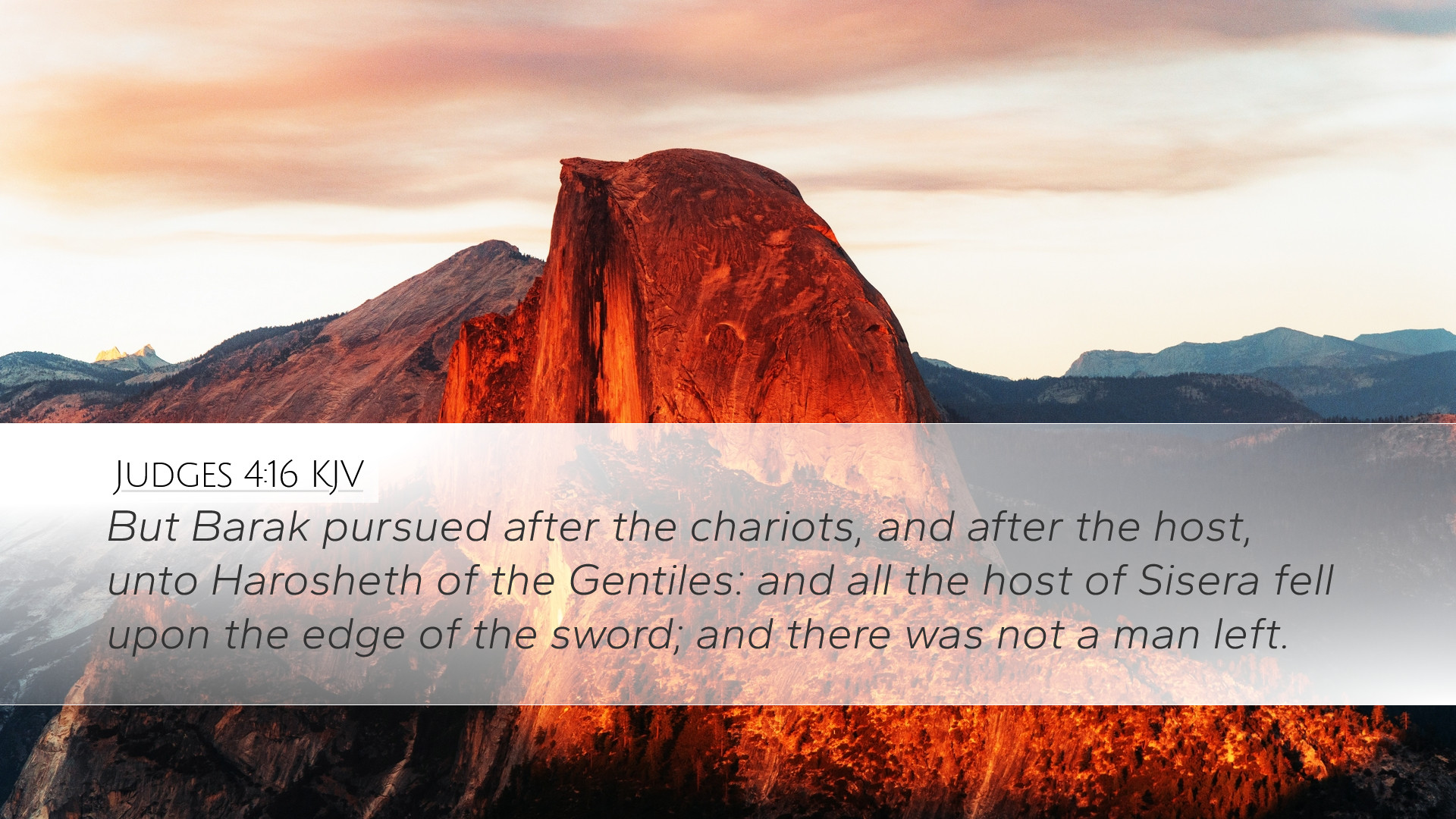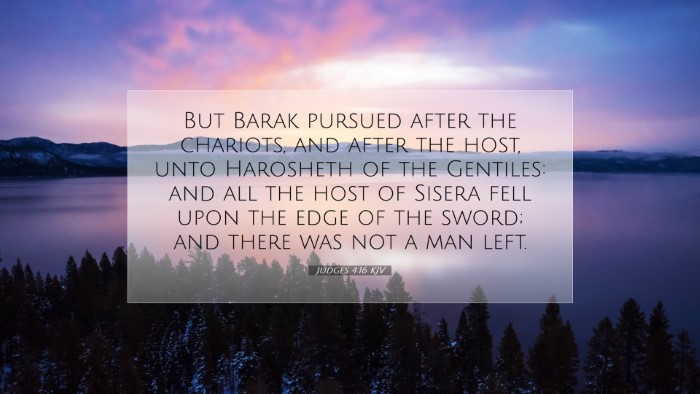Old Testament
Genesis Exodus Leviticus Numbers Deuteronomy Joshua Judges Ruth 1 Samuel 2 Samuel 1 Kings 2 Kings 1 Chronicles 2 Chronicles Ezra Nehemiah Esther Job Psalms Proverbs Ecclesiastes Song of Solomon Isaiah Jeremiah Lamentations Ezekiel Daniel Hosea Joel Amos Obadiah Jonah Micah Nahum Habakkuk Zephaniah Haggai Zechariah MalachiJudges 4:16
Judges 4:16 KJV
But Barak pursued after the chariots, and after the host, unto Harosheth of the Gentiles: and all the host of Sisera fell upon the edge of the sword; and there was not a man left.
Judges 4:16 Bible Commentary
Commentary on Judges 4:16
Judges 4:16 states: "But Barak pursued after the chariots, and after the host, unto Harosheth of the Gentiles: and all the host of Sisera fell upon the edge of the sword; and there was not a man left." This verse captures a pivotal moment in the narrative of Deborah and Barak's victory over Sisera, a commander of the Canaanite army, and highlights key theological themes and practical lessons relevant to pastors, students, and scholars.
Theological Significance
This passage stands as a testament to God's sovereignty in the affairs of men. Throughout the book of Judges, we observe the cyclical pattern of Israel's disobedience, oppression, repentance, and deliverance. Barak's pursuit of Sisera signifies not just a military venture but also an act of faith, trusting in God's promises and His empowerment through Deborah's prophetic leadership.
1. The Role of Divine Guidance
In the earlier verses of this chapter, Deborah, as a prophetess and judge, plays a crucial role, outlining God's command to Barak. As Albert Barnes notes, Barak acts in obedience to this divine directive. This underscores the importance of seeking God's guidance in leadership and decision-making, which is a vital lesson for both pastors and church leaders today.
2. The Nature of God’s Deliverance
Matthew Henry emphasizes that God's deliverance often involves human instruments, illustrating that while God is the ultimate warrior, He works through people willing to act in faith. Barak’s success against Sisera’s formidable army is not solely due to his military prowess but underlines God’s planning and purpose in the events transpiring. As such, this reflects the symbiotic relationship between divine sovereignty and human agency.
Practical Lessons for Leadership
From a practical perspective, the task of pursuing Sisera teaches church leaders about the nature of spiritual warfare. It signifies an active response to God’s command and requires courage and commitment to confront the challenges ahead.
1. Courage in Spiritual Endeavors
Barak's willingness to pursue Sisera, despite his superior might and tactical advantages, reveals the essence of courage in faith-based leadership. As Adam Clarke comments, Barak's actions reflect a profound trust in God’s promises. Pastors should encourage their congregations to step out in faith, emphasizing that God equips those whom He calls, much like He supported Barak.
2. The Importance of Holistic Discipleship
The narrative emphasizes the holistic approach Barak took, as he did not merely seek victory but the complete defeat of Sisera’s forces. For modern ministers, this illustrates the need for discipleship that seeks full transformation rather than partial victory. Spreading the Gospel is not just about conversion but about nurturing and mentoring believers to live out their faith fully.
Understanding the Context
A thorough understanding of the historical and cultural context provides depth to the interpretation of this verse. Sisera’s defeat represents a critical juncture in Israel’s liberation from Canaanite oppression. As Barnes highlights, the significance of Harosheth, as Sisera's base, points to the larger battle between good and evil that characterizes Israel's history during the Judges period.
1. Symbolism of Locations
The choice of Harosheth (meaning "the place of the chariots") is laden with symbolism. The chariots represented the pinnacle of military technology and power in that era. The destruction of Sisera’s forces at this backdrop illustrates God's ability to render human strength impotent. This should resonate profoundly with contemporary readers who may feel overwhelmed by the might of current ‘Giants’ in society.
2. Contrast of Faith versus Military Might
The ensuing battle illustrates a great contrast between faith and the flesh. Barak pursued Sisera not with human reliance on weapons alone but with faith in God's promised victory, which enables believers today to characterize their struggles against sin and adversities. As noted by Henry, this reliance on divine power rather than mere human strategy is a foundational principle in Christian life.
Conclusion
Judges 4:16 encapsulates a story of victory attributed not merely to human endeavor but to God’s faithfulness. For pastors and church leaders, it provides an exuberant reminder of the necessity of divine reliance in all undertakings. The narrative enriches the understanding of God’s sovereignty, the significant role of faithful leaders, and the effective action that stems from assured faith. This historical account within Judges serves as a compelling call to today’s believers to embrace the challenges ahead with courage, divine guidance, and a holistic mission of discipleship.


